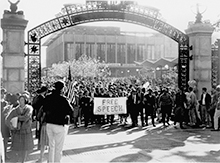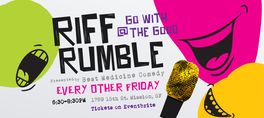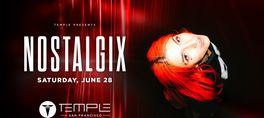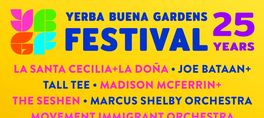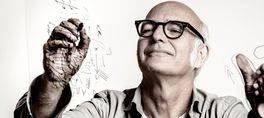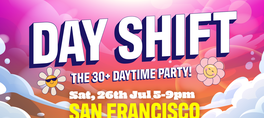Thu September 11, 2014
Berkeley in the Sixties (Mark Kitchell; US, 1990)
SEE EVENT DETAILS
at PFA Theater
(see times)
Special Guests: FSM activists Frank Bardacke, Lynne Hollander Savio;
Frank Bardacke was a member of the Oakland Seven antiwar protestors and was arrested during the occupation of Sproul Hall. Lynne Hollander Savio was also arrested during the occupation of Sproul Hall and is the chair of the Mario Savio Memorial Lecture Fund.
More than a primer for a tumultuous decade, Mark Kitchell’s wide-ranging documentary is an astute distillation of an audacious effort to reinvent the terms of citizenship, from passivity before power to an insistence that every voice be valued. The place this occurred was, of course, Berkeley, but its nexus was the campus where student activism found its critical mass and its voice, boldly reified by Mario Savio in the fall of 1964. A mélange of archival footage complements contemporary interviews with some of the most prominent activists of that era, many of whom are still engaged in political work: Frank Bardacke, Jackie Goldberg, Susan Griffin, Bobby Seale, Jack Weinberg, and others. The Free Speech Movement (FSM) is the rightful centerpiece of Kitchell’s gripping portrait, but he traces its roots back to 1960 when the House Un-American Activities Committee provoked the disdain of Cal students during its San Francisco hearings. The suppression of political speech on the Berkeley campus in 1964 became the lens that refocused student ire, leading to the formation of the FSM. UC President Clark Kerr’s declaration that the University was a “factory” and the students, by extension, its raw materials, inspired Savio’s memorable “you've got to indicate to the people who run it, to the people who own it, that unless you're free, the machine will be prevented from working.” Crowned by the occupation of Sproul Hall, this short-lived movement was soon overshadowed by the Vietnam War and growing resistance to the draft. The decade’s spirited activism was desperately bludgeoned in 1969 when the utopian aspiration for a People’s Park was snuffed by then-governor Ronald Reagan’s brutish response. Where Berkeley in the Sixties excels is in its portrayal of the newly coined counterculture and its desire to reinvent relationships of power. A pungent mix of differing political outlooks, anti-establishment stylings, and generational mindfulness, that pivotal decade encouraged personal engagement as a principled right of passage.
• Written by Kitchell, Susan Griffin, Stephen Most. Photographed by Stephen Lighthill. (117 mins, Color/B&W, 16mm, BAM/PFA Collection)
show less
Frank Bardacke was a member of the Oakland Seven antiwar protestors and was arrested during the occupation of Sproul Hall. Lynne Hollander Savio was also arrested during the occupation of Sproul Hall and is the chair of the Mario Savio Memorial Lecture Fund.
More than a primer for a tumultuous decade, Mark Kitchell’s wide-ranging documentary is an astute distillation of an audacious effort to reinvent the terms of citizenship, from passivity before power to an insistence that every voice be valued. The place this occurred was, of course, Berkeley, but its nexus was the campus where student activism found its critical mass and its voice, boldly reified by Mario Savio in the fall of 1964. A mélange of archival footage complements contemporary interviews with some of the most prominent activists of that era, many of whom are still engaged in political work: Frank Bardacke, Jackie Goldberg, Susan Griffin, Bobby Seale, Jack Weinberg, and others. The Free Speech Movement (FSM) is the rightful centerpiece of Kitchell’s gripping portrait, but he traces its roots back to 1960 when the House Un-American Activities Committee provoked the disdain of Cal students during its San Francisco hearings. The suppression of political speech on the Berkeley campus in 1964 became the lens that refocused student ire, leading to the formation of the FSM. UC President Clark Kerr’s declaration that the University was a “factory” and the students, by extension, its raw materials, inspired Savio’s memorable “you've got to indicate to the people who run it, to the people who own it, that unless you're free, the machine will be prevented from working.” Crowned by the occupation of Sproul Hall, this short-lived movement was soon overshadowed by the Vietnam War and growing resistance to the draft. The decade’s spirited activism was desperately bludgeoned in 1969 when the utopian aspiration for a People’s Park was snuffed by then-governor Ronald Reagan’s brutish response. Where Berkeley in the Sixties excels is in its portrayal of the newly coined counterculture and its desire to reinvent relationships of power. A pungent mix of differing political outlooks, anti-establishment stylings, and generational mindfulness, that pivotal decade encouraged personal engagement as a principled right of passage.
• Written by Kitchell, Susan Griffin, Stephen Most. Photographed by Stephen Lighthill. (117 mins, Color/B&W, 16mm, BAM/PFA Collection)
Special Guests: FSM activists Frank Bardacke, Lynne Hollander Savio;
Frank Bardacke was a member of the Oakland Seven antiwar protestors and was arrested during the occupation of Sproul Hall. Lynne Hollander Savio was also arrested during the occupation of Sproul Hall and is the chair of the Mario Savio Memorial Lecture Fund.
More than a primer for a tumultuous decade, Mark Kitchell’s wide-ranging documentary is an astute distillation of an audacious effort to reinvent the terms of citizenship, from passivity before power to an insistence that every voice be valued. The place this occurred was, of course, Berkeley, but its nexus was the campus where student activism found its critical mass and its voice, boldly reified by Mario Savio in the fall of 1964. A mélange of archival footage complements contemporary interviews with some of the most prominent activists of that era, many of whom are still engaged in political work: Frank Bardacke, Jackie Goldberg, Susan Griffin, Bobby Seale, Jack Weinberg, and others. The Free Speech Movement (FSM) is the rightful centerpiece of Kitchell’s gripping portrait, but he traces its roots back to 1960 when the House Un-American Activities Committee provoked the disdain of Cal students during its San Francisco hearings. The suppression of political speech on the Berkeley campus in 1964 became the lens that refocused student ire, leading to the formation of the FSM. UC President Clark Kerr’s declaration that the University was a “factory” and the students, by extension, its raw materials, inspired Savio’s memorable “you've got to indicate to the people who run it, to the people who own it, that unless you're free, the machine will be prevented from working.” Crowned by the occupation of Sproul Hall, this short-lived movement was soon overshadowed by the Vietnam War and growing resistance to the draft. The decade’s spirited activism was desperately bludgeoned in 1969 when the utopian aspiration for a People’s Park was snuffed by then-governor Ronald Reagan’s brutish response. Where Berkeley in the Sixties excels is in its portrayal of the newly coined counterculture and its desire to reinvent relationships of power. A pungent mix of differing political outlooks, anti-establishment stylings, and generational mindfulness, that pivotal decade encouraged personal engagement as a principled right of passage.
• Written by Kitchell, Susan Griffin, Stephen Most. Photographed by Stephen Lighthill. (117 mins, Color/B&W, 16mm, BAM/PFA Collection)
read more
Frank Bardacke was a member of the Oakland Seven antiwar protestors and was arrested during the occupation of Sproul Hall. Lynne Hollander Savio was also arrested during the occupation of Sproul Hall and is the chair of the Mario Savio Memorial Lecture Fund.
More than a primer for a tumultuous decade, Mark Kitchell’s wide-ranging documentary is an astute distillation of an audacious effort to reinvent the terms of citizenship, from passivity before power to an insistence that every voice be valued. The place this occurred was, of course, Berkeley, but its nexus was the campus where student activism found its critical mass and its voice, boldly reified by Mario Savio in the fall of 1964. A mélange of archival footage complements contemporary interviews with some of the most prominent activists of that era, many of whom are still engaged in political work: Frank Bardacke, Jackie Goldberg, Susan Griffin, Bobby Seale, Jack Weinberg, and others. The Free Speech Movement (FSM) is the rightful centerpiece of Kitchell’s gripping portrait, but he traces its roots back to 1960 when the House Un-American Activities Committee provoked the disdain of Cal students during its San Francisco hearings. The suppression of political speech on the Berkeley campus in 1964 became the lens that refocused student ire, leading to the formation of the FSM. UC President Clark Kerr’s declaration that the University was a “factory” and the students, by extension, its raw materials, inspired Savio’s memorable “you've got to indicate to the people who run it, to the people who own it, that unless you're free, the machine will be prevented from working.” Crowned by the occupation of Sproul Hall, this short-lived movement was soon overshadowed by the Vietnam War and growing resistance to the draft. The decade’s spirited activism was desperately bludgeoned in 1969 when the utopian aspiration for a People’s Park was snuffed by then-governor Ronald Reagan’s brutish response. Where Berkeley in the Sixties excels is in its portrayal of the newly coined counterculture and its desire to reinvent relationships of power. A pungent mix of differing political outlooks, anti-establishment stylings, and generational mindfulness, that pivotal decade encouraged personal engagement as a principled right of passage.
• Written by Kitchell, Susan Griffin, Stephen Most. Photographed by Stephen Lighthill. (117 mins, Color/B&W, 16mm, BAM/PFA Collection)
show less
Date/Times:
PFA Theater
2575 Bancroft Way, Berkeley, CA 94720
The Best Events
Every Week in Your Inbox
From Our Sponsors
UPCOMING EVENTS
Great suggestion! We'll be in touch.
Event reviewed successfully.
